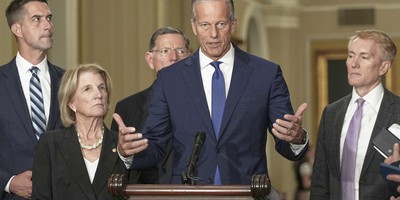Editor's note: This piece was co-authored by Megan Jenkins.
Much has been made of Vivek Ramaswamy’s exit from DOGE to focus on other aspirations. Some have reported that Elon Musk and Ramaswamy had different visions for DOGE. While Elon Musk has been focused on boosting entrepreneurship, Ramaswamy was focused on constitutional separation of powers. And both are right. While Musk focuses on the symptoms, Ramaswamy focused on the disease. The medicine is the same—strengthening the constitutional separation of powers.
Regulatory reform is not just an abstract policy discussion—it is an economic imperative and a constitutional necessity. The creation of the Department of Government Efficiency (DOGE) could help get America back on track by addressing the corrosive effect of overregulation on economic dynamism and constitutional principles.
The United States faces an existential threat in the form of a regulatory state that stifles innovation and economic growth. Excessive regulation chokes off economic potential, harming real Americans by increasing costs and limiting economic opportunity. At the same time, these regulations often result from unconstitutional overreach by executive agencies, bypassing Congress and undermining the separation of powers.
The concept of DOGE is rooted in the idea of reducing government overreach while respecting the boundaries of constitutional authority. By auditing, reducing, and optimizing federal regulations, such a department could unlock tremendous economic potential and restore accountability to the regulatory process.
Economics: The Case for Regulatory Reform
The economic argument for reducing regulatory burdens is straightforward. Excessive and outdated regulations impose costs on businesses, discouraging investment and innovation. The National Association of Manufacturers released a 2023 study that found federal regulations cost over $3 trillion annually in lost economic output. That equates to 12% of GDP—a staggering figure.
Recommended
On the other hand, regulatory reform could unlock innovation, new employment opportunities, and greater prosperity. A 2013 study by economists John Dawson and John Seater estimated that reducing the federal regulatory burden to 1949 levels would increase the growth rate of the economy by 2% annually. Over time, that compounding growth would have real and positive effects for the American people. Consider the energy sector, where regulatory reform could unleash large-scale economic activity and lower costs for consumers. The permitting process for new energy projects can add up to ten years to a project timeline, due to overlapping federal and state requirements. Streamlining these processes would not only boost GDP; it also would reduce energy costs for consumers—a win-win scenario.
Similarly, the tech industry—including cryptocurrency markets—has been hamstrung by uncertain and overly aggressive regulatory actions. The Securities and Exchange Commission (SEC) and other agencies often regulate through enforcement, creating uncertainty that deters investment. Providing clear, predictable rules would unleash the full potential of blockchain technologies and other innovations, further driving economic growth.
The Constitutional Argument
While the economic case for regulatory reform is compelling, the constitutional argument is equally urgent. Much of the federal regulatory apparatus operates in direct violation of the separation of powers, created by the Founders to protect individual liberty. Congress, not unelected bureaucrats, is constitutionally tasked with making laws. Yet agencies routinely create rules with the force of law, effectively legislating from the executive branch.
This “administrative state” undermines democratic accountability and concentrates power in ways the Founders explicitly sought to avoid. The Supreme Court has begun to push back, most notably in cases like West Virginia v. EPA, which curtailed the Environmental Protection Agency’s ability to regulate greenhouse gas emissions without clear congressional authorization. But the problem remains pervasive.
Reining in the administrative state would restore constitutional balance while reducing the economic drag of overregulation. If Congress had to explicitly authorize major regulatory actions, lawmakers would be forced to consider their economic implications and answer to voters for the consequences.
Innovation and the Path Forward
The power of innovation to drive economic growth is undeniable. Elon Musk’s ventures have revolutionized industries, from electric vehicles to space exploration. Ramaswamy’s advocacy for deregulation echoes the same ethos: Let entrepreneurs innovate without undue interference.
By focusing on reducing regulatory burdens and ensuring that rules are clear and constitutionally sound, DOGE could pave the way for a new era of innovation and economic growth. The rise of cryptocurrencies, gig work, ride-sharing, and other disruptive technologies reflects a public yearning for alternatives to outdated systems. But these innovations often face regulatory roadblocks that serve entrenched interests rather than the public good.
Reducing regulatory burdens doesn’t mean abandoning oversight or safety standards. It means prioritizing clarity, efficiency, and constitutionality. Congress should focus on passing broad, bipartisan regulatory reform, including measures like the REINS Act, which would require congressional approval for major rules.
A Dual Benefit: Economic Growth and Deficit Reduction
By aligning regulatory policy with both economic and constitutional principles, the U.S. can achieve a virtuous cycle of growth. Less regulation means more innovation and investment, leading to higher GDP and better outcomes for Americans. At the same time, restoring the proper separation of powers would make the government more accountable and less prone to overreach. At the end of the day, it’s regular Americans who would benefit from these reforms.
The stakes are high. Without significant reform, the U.S. risks falling into a cycle of stagnation, where high deficits and low growth feed each other in a downward spiral. But with bold action, we can unlock the potential of our economy while reaffirming the constitutional principles that make our nation exceptional.
The Department of Government Efficiency offers a roadmap. The question is whether policymakers have the courage to follow it.
Megan Jenkins is the strategic research director at Pacific Legal Foundation. Daniel Dew is the legal policy director at Pacific Legal Foundation.

























Join the conversation as a VIP Member